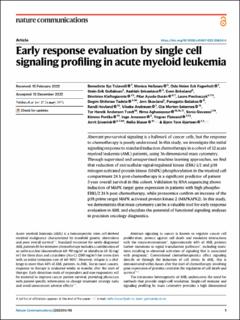Early response evaluation by single cell signaling profiling in acute myeloid leukemia
Tislevoll, Benedicte Sjo; Hellesøy, Monica; Fagerholt, Oda Helen Eck; Gullaksen, Stein-Erik; Srivastava, Aashish; Birkeland, Even; Kleftogiannis, Dimitrios; Ayuda Duran, Pilar; Piechaczyk, Laure Isabelle; Tadele, Dagim Shiferaw; Skavland, Jørn; Panagiotis, Baliakas; Hovland, Randi; Andresen, Vibeke; Seternes, Ole Morten; Tvedt, Tor Henrik Anderson; Aghaeepour, Nima; Gavasso, Sonia; Porkka, Kimmo; Jonassen, Inge; Fløisand, Yngvar; Enserink, Jorrit; Blaser, Nello; Gjertsen, Bjørn Tore
Journal article, Peer reviewed
Published version

Åpne
Permanent lenke
https://hdl.handle.net/11250/3077440Utgivelsesdato
2023Metadata
Vis full innførselSamlinger
- Department of Clinical Science [2318]
- Registrations from Cristin [9791]
Sammendrag
Aberrant pro-survival signaling is a hallmark of cancer cells, but the response to chemotherapy is poorly understood. In this study, we investigate the initial signaling response to standard induction chemotherapy in a cohort of 32 acute myeloid leukemia (AML) patients, using 36-dimensional mass cytometry. Through supervised and unsupervised machine learning approaches, we find that reduction of extracellular-signal-regulated kinase (ERK) 1/2 and p38 mitogen-activated protein kinase (MAPK) phosphorylation in the myeloid cell compartment 24 h post-chemotherapy is a significant predictor of patient 5-year overall survival in this cohort. Validation by RNA sequencing shows induction of MAPK target gene expression in patients with high phospho-ERK1/2 24 h post-chemotherapy, while proteomics confirm an increase of the p38 prime target MAPK activated protein kinase 2 (MAPKAPK2). In this study, we demonstrate that mass cytometry can be a valuable tool for early response evaluation in AML and elucidate the potential of functional signaling analyses in precision oncology diagnostics.
